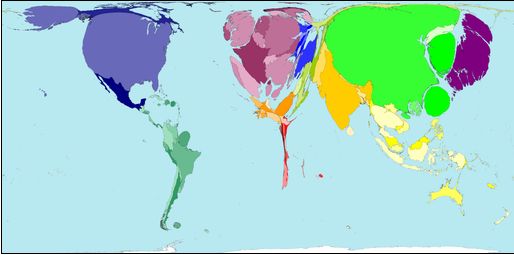All across Africa there are churches. While there may be unreached parts, one cannot deny that Africa has churches practically everywhere. The Gospel is being preached in Africa, week after week, and millions are coming to the Lord.
 Yet, this map of the world shows something astounding, something that should make us ask: Is this Gospel being preached across Africa effective? Or is there something missing from it? Is it really the FULL Gospel being preached?
Yet, this map of the world shows something astounding, something that should make us ask: Is this Gospel being preached across Africa effective? Or is there something missing from it? Is it really the FULL Gospel being preached?
The map basically shows the wealth distribution of the world, taking trends from 1975 to 2002 and predicting how things will look in 2015. Notice Africa – a pencil line in comparison to a small island like Japan, on the right, which has had two nuclear bombs thrown on it and has NO natural resources to rely on.
Yet the Gospel goes out to Africa week after week and we don’t see any change for the poor in Africa? You don’t see true upliftment but only charity after charity, trying its best. You’ve got to come to the conclusion that something is wrong with the Gospel being preached in Africa, if anything. Why, after the Gospel has permeated for so many years, have we seen no change in Africa?
From a purely theological point of view you might look at what is being preached and say that there doesn’t seem to be anything wrong with it. So what is the problem? Why do we still see so much rampant poverty?
It may not be that the Gospel being preached is WRONG, only INCOMPLETE. The thrust of the message is one of personal salvation or believe in Jesus and you go to heaven. But there is no talking of Kingdom NOW, only Kingdom THEN. There’s no talking about transformation now, but only talk about that glorious day when the Lord returns and then justice and everything will be set right. Are we really supposed to wait only then until justice happens? Doesn’t this square straight against the Bible which says we are to be people of justice here, on Earth? Salt to the world?
Interestingly, it was the European reformation which helped Europe to get itself out of poverty as the Protestant work ethic became more prominent (read a book by Darrow Miller called “Discipling Nations”). Protestants came up with the whole idea of no separating between sacred and secular, yet protestant churches these days do, and they do it all the time. Another statistic shows (I don’t have the reference for this, but I’ve heard it before, so you’ll have to believe me on this) that South Africa is something like 75 percent a Christian nation. Yet, of that 75 percent, 85 percent (or thereabouts) do not believe that Christians should be involved in politics. So they will rather pray on the side while handing government over to non-believers. Is that really what Jesus wants us to do?
This post-colonial challenge goes down to your Gospel. Does it proclaim freedom and liberty to the poor? Is it about God’s will being on Earth, as it is in Heaven? Is it God’s will that Africa should live in such poverty? that corrupt and injust leadership should continue to rule the masses? I’m sure any Christian would say “no” so then examine your Gospel and ascertain if it is truly complete, or does it just focus on personal salvation and separate “spirituality” from practical living (which I’ll argue isn’t true spirituality anyway). It may be relevant to personal salvation, but is it relevant to the broad message of salvation so clear in the scriptures? That even creation itself will be redeemed!
Is your Gospel effective? Is it complete? This is a post-colonial challenge to the African church
You will find this article and more on this topic at http://www.emergingafrica.info/
